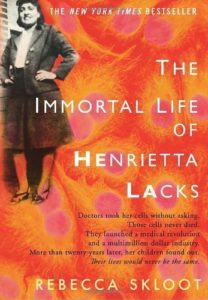
The Immortal Life of Henrietta Lacks
What a surprisingly fascinating read. I say surprisingly because I really wasn’t looking forward to reading the book. Well, sort of… let me clarify: I was searching through audio-books at my local library, in hopes of finding more good books to listen to during my travels. I saw this one by chance, and it caught my attention ONLY because I used to work in research, and HeLa cells were something we easily purchased from our lab suppliers for our continued research. I knew HeLa cells were initially from a real person, Henrietta Lacks, who unfortunately died as a result of her cervical cancer. But other than that, I really didn’t know anything about the person behind the cells.
Don’t get me wrong, I know plenty about the cell line: it is cancerous, and is immortal via the telomerase pathway. Most scientists who know that much generally don’t know the rest of the science. Even though the telomerase pathway is utilized by these cancer cells to live forever, their telomeres are still forever critically short, despite the activation of the enzyme that makes them longer. I also knew the cell line has been alive since the 1950’s, and that no two labs who have been growing their HeLa cell lines continue to have identical strains. They mutate enough that two labs who received the same sample initially, no longer have the same mutations in their cell lines after a certain number of population doublings. But all this was not yet known back in the 50’s.
Don’t worry, this book is nothing like my paragraph above, which is why I was reluctant about reading it. I stared at the title and image, and kept wondering if this would be a repeat of a required book for university like the The Double Helix: A Personal Account of the Discovery of the Structure of DNA by James D. Watson. While that book was useful history, it was difficult to get passed the pompous attitude displayed throughout the book (though an important book on the discovery of the double helix none the less). So I kept procrastinating about reading this book based on previous experiences. Then finally, I said, okay Tober, listen to Chapter 1, and go from there.
Perhaps, because this was written by someone who truly wanted to know Henrietta Lacks, not the cells, that this book is so amazing. Yeah, I said amazing.
This book is not at all what I expected. What I thought I knew about the cell line, which is just a cell line purchased in a catalog, called “HeLa” based on the contributors name, has a history to its beginning (as now I imagine most other cell lines do too). This book is all about Henrietta Lacks and her family, her cervical cancer, how it got in the hands of researchers, and what happened to her and then her family after she passed.
But this book is not limited to Henrietta Lacks. While everything in this book is related to her cell line, it also includes the consideration of many ethical questions about science and research that were never addressed before. Many of them have still not been addressed today. I will admit, this book really made me ask some very deep ethical questions – many of which were answered as much as possible at the end.
When the labs I used to work in ordered “HeLa” cells for our research, we never gave two thoughts about the importance this cell line had among the scientific community. But having read this book, I realize that Henrietta Lack’s pain and suffering has not gone unnoticed or forgotten. Her cell line was a major contributer to the development of vaccinations such as polio, among others, and continues to be used in research to this day (over 70 years after her death) to expand science and help medical science prevent death and treat disease.
The question I never asked, nor ever considered because I had no reason to, was whether or not the family of Henrietta received just (or any) compensation for her physical contribution to the scientific community. Sadly, the answer is no. Her cancerous cells were taken, replicated, and distributed without her or her families full EDUCATED consent. Apparently, this happens all too often. And once something becomes part of the scientific community, making sure that the family of a deceased contributor received just compensation, is not part of our every day lives.
This isn’t a book about some woman with cancer, nor is this a book about science. This is a historical story that you would only hear around a campfire form your family, cousins, and friends – if they were scientists interested in history. These are not topics discussed lightly, the ethical concerns are real, and some of the questions you may develop while reading this book may never be answered.
If you like science, if you enjoy research, or if you value our current progress in medicine, then this story, is possibly one of the more important works on science you will ever read. This book is based on as much fact as possible, considering the lack of information on the topic prior to the author researching and writing this book. I would have much preferred to read this over the double helix when I was in college (hint hint science professors). Just saying.
Did I mention this book was amazing?
Nature's Complement is a participant in the Amazon Services LLC Associates Program, an affiliate advertising program. If you purchase products on Amazon through any of our affiliate links, we get a small percentage of the transaction, at no extra cost to you. We spend a lot of time writing the articles on this site, and all this information is provided free of charge. When you use our affiliate links, you support the writing you enjoy without necessarily buying our products. (However we would appreciate if you would do that too!) Thank you for helping to support our work, however you choose to do so.
These statements have not been evaluated by the Food and Drug Administration. This information and/or products are not intended to diagnose, treat, cure or prevent any disease.


